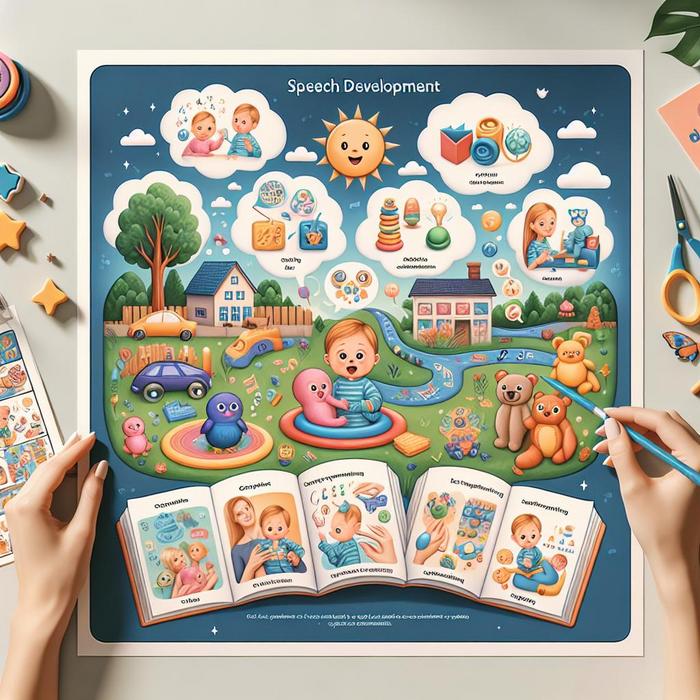Efficient Speech Development Tips
The first words your baby utters mark a significant milestone in their development. However, equipping them with effective communication skills involves more than just waiting for these initial words. As parents, we can provide a nurturing environment for our baby’s speech development through various activities and games. This blog post will explore some of the most effective baby talking techniques and engaging activities we’ve used to enhance our little one’s early communication skills.
Introducing Early Communication Games
While speech therapists are equipped with a myriad of techniques to boost your child’s language skills, many activities can be easily replicated at home. Interactive games form an integral part of these methods and can be fun and rewarding for both parents and baby. Here are a few games that we’ve found very effective:
- Peekaboo: Simple and timeless, the game of peekaboo is a great first game for babies. It helps them understand the concept of object permanence and introduces them to the back-and-forth rhythm of conversation.
- Interactive Reading: Reading books with large, colorful pictures and simple texts together can help your baby associate words with pictures, enhancing their speech and cognitive skills.
- Sing-along songs: Songs that include actions, such as ‘The Wheels on the Bus’ or ‘If You’re Happy and You Know It’, encourage active participation and can help boost your baby’s listening and mimicking skills.
For more game ideas, the TheraPlatform blog and the USA College blog offer a variety of online speech therapy games that can be easily incorporated into your daily routine.
Creating a Language-Rich Environment
Crafting a language-rich environment can significantly boost your baby’s language development. Here are some easy ways to do this:
- Talk to Your Baby: Engage in constant conversation with your baby throughout the day. Describe what you’re doing, name objects, and respond to their coos and babbles to encourage conversational turn-taking.
- Active Listening: Show your baby that you are interested in what they ‘say’ by maintaining eye contact and responding enthusiastically to their attempts at communication.
- Use Sign Language: Baby sign language can provide an alternative way for babies to communicate their wants and needs before they can verbalize them. This often reduces frustration and encourages them to continue communicating.
To learn more about creating an optimal environment for speech development, I recommend checking out other articles on our site, such as Managing Stress as a New Parent and Childproofing Your Home Office.
Using Toys and Technology for Speech Development
Appropriate toys and technology can also be effective tools for enhancing your child’s speech development. Simple toys such as dolls, blocks, or play-vehicles encourage imaginative play and language use. Similarly, educational apps and games can offer interactive language-building exercises.
For a comprehensive list of online activities and resources for speech therapy, visit Speech Therapy Store and the SLP Now blog.
The journey to articulate speech might seem long and challenging, but with patience, consistency, and the right approach, you can significantly contribute to your child’s journey of discovering the power of communication.
Story Telling
Storytelling is an excellent method to stimulate your child’s imagination and vocabulary. Start with simple narratives with a clear structure – a beginning, middle, and end. Use facial expressions, varying voices, and manual gestures to bring the story to life and maintain their interest. You could even encourage your child to join in, either by repeating phrases or contributing to the story.
For a helpful guide on using storytelling for speech development, Sparklle SLP has an insightful article on the concept.
Identifying & Responding to Early Signs Of Speech Delays
While every child develops at their own pace, there are benchmarks to help you monitor your child’s progress. If your child isn’t meeting these milestones, or you notice other signs of a possible speech delay, it’s important to consult with a professional early. These signs might include limited vocabulary, difficulties following instructions, or issues with pronunciation.
For more detailed information, the American Speech-Language-Hearing Association’s website has a comprehensive guide to encourage speech and language development.
Investing in Speech Therapy Resources
Investing in quality resources, books, and aids offers additional support in developing your child’s speech. Look for materials that are age and developmentally appropriate, engaging, and promote active learning. Flashcards, picture books, and age-appropriate educational games are great options.
If you’re seeking digital resources that can help, Speech Sprouts provides an extensive list of free online games for speech therapy that will keep your learning sessions fun and engaging.
Nurturing a Supportive & Encouraging Environment
Sustaining an environment of positivity is crucial for your child’s confidence. Providing consistent positive reinforcement will inspire them to further explore and attempt new words and sounds. Encourage attempts, celebrate achievements, and have patience during this important developmental stage.
Maintaining Regular Check-ins with Professionals
Regular consultations with a pediatrician or speech-language pathologist can be vital in monitoring your child’s progress and offering individualized advice throughout the speech development journey. These professionals provide guidance on suitable methods, reassurance on progress, and early intervention if required.
For sessions ranging from planned evaluation to targeted treatment plans, Unique Pathways provides a variety of valuable speech therapy games for effective language development
Remember, the journey to articulate speech is unique for every child. With your loving support, keen observation, and consistent practice, you will bolster not only your baby’s language skills but their confidence and emotional bonding too. Stay positive, have patience, and enjoy every moment in this significant phase of your child’s life.
